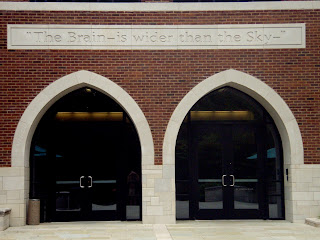Today we commemorate the achievements of the great Japanese film director Akira Kurosawa on the tenth anniversary of his passing. Kurosawa made countless contributions to the understanding of human behavior. He provided us with one of the most impressive descriptions of the changing relationship between humans and nature with his narrative on the life of the hunter Dersu Uzalain the vastness of Siberia around the turn of the last century. In Rashomon,
he tells us about the treacherous mission of a judge attempting to establish the truth in a criminal case. The search ends in the admission that objective actuality cannot be established from subjective experience, arguing profoundly for the use of the scientific method in our lives. Kurosawa's most striking contributions touch on human leadership. In one of his short films collected in Dreams,
a retired officer recounts his life-long nightmare of having sent his soldiers on a mission, from which none returned. The film paints in graphic, indelible strokes the pains of war and the horrid memories that torment the man decades after the experience. It argues strongly that for their own sanity officers must go first, leading their troops into action. In Seven Samurai,
Kurosawa portrays the ambiguous relationship between citizenry and military. In times of war, we love our military. In times of peace, we feel no need for it. Leadership and power pervade Kurosawa's brilliant adaptations of Shakespear's plays, transposing them into the Japan of the Shoguns and Samurai (Ran).
The master tells about the challenges of leadership most strikingly in Kagemusha.A great warlord is mortally wounded in a siege. In order to ensure the success of the campaign, his advisers decide to search for a substitute. They find the ideal candidate in the person of a beggar sentenced to die for a small crime. In exchange for his life, the man pledges to play the lord's role until the campaign is over. He resembles the deceased noble so much that even the wives and concubines mistake him. The advisers teach him the manners of life at court. The man learns his lessons and gradually adopts his new role as the lord. However, at all times he is plagued by the anxiety about wrongfully assuming the role of some one above his station. Moreover, his fear lingers that the nobles will kill him, once they do not need him anymore. But he plays his role well, so well in fact that he assumes true leadership in the most decisive moment on the battlefield.
After his formidable performance, the exhilarated advisers ask him to stay on. He declines. His ingrained sense of status forbids it. He feels that lordship is not a beggar's station. Plus, he was just a stand in, a deception. With regret, the nobles set him free. They toss him out on a country road where he resumes his old life of an impoverished vagrant. But his innocence is lost. He remains eternally tormented, witnessing that without his leadership the kingdom succombs to the onslaught of its adversaries.
This great tale offers many lessons for modern leadership. For example, academe today is still governed with a strong sense hierarchy. Young talent is hired on the promise of success and tenured once the promise is fulfilled. In U.S. research universities, the success is pegged to the amount of research dollars garnered from Federal agencies. These agencies add about 50 % indirect cost for overhead expenditures on every dollar they pay out in direct costs for the research. Only a bit more than a tenth of the research proposals is funded. However, assuming a rate of 50 % overhead American universities recover roughly $8 billion in indirect cost from grants awarded by the National Institutes of Health alone in fiscal year 2008. Without this sizable allotment, many institutions could not sustain themselves. Therefore, the pressure on the faculty to obtain federal funding is exorbitant. Established funding histories become necessary prerequisites for tenure and further promotion. This struggle consumes many a talented scientist, turning beggars into warlords they should not be, in analogy to Kurosawa's tale.
Often the energy is spent, once tenure is obtained. Creativity is drained. Productivity ceases. Soon funding evaporates. It becomes harder and harder to make a scientific contribution or even to keep up appearances. At that stage, universities have not developed adequate and effective mechanisms to realign faculty salary with performance. Offers for early retirement may leave a decade of limbo which neither the concerned faculty nor the university knows how to fill meaningfully. Administrative promotion may not provide a solution. Too easily, the Peter Principle applies. That is, faculty members are promoted to functions with ever greater expectations and fail. Since the academic promotion system is unidirectional, a sizable fraction of the hard-won Federal funding is bound to be spent on high salaries with little to show for. Frustration mounts among the involved parties, and the mind that is supposed to be preoccupied with finding the solutions for tomorrow's problems is increasingly consumed with the struggle for meaning and place in a combative environment. At this juncture, it is wholesome to reflect on one's original goals in life and on a timely strategy to negotiate a dignified and respectful path back to these goals.
In Kurosawa's tale, the beggars' decision to return to his former life was of defining importance not only for his own fate, but also for the fate of his country. The audience is left with the sense that he should have stayed on the job. His belief in predestination and his truthfulness prevented him from doing so. In our society unbound by destined fate, thorough reflection and careful planning should help us to develop and offer favorable individualized solutions, facilitating the proper choice at the opportune moment.
Addendum
- Today, National Public Radio's All Things Considered reported in a segment by Iris Mann entitled "A Kurosawa Celebration, From Many Angles" about Akira Kurosawa's achievements on the occasion of the restoration of Rashomon (11/10/08).



